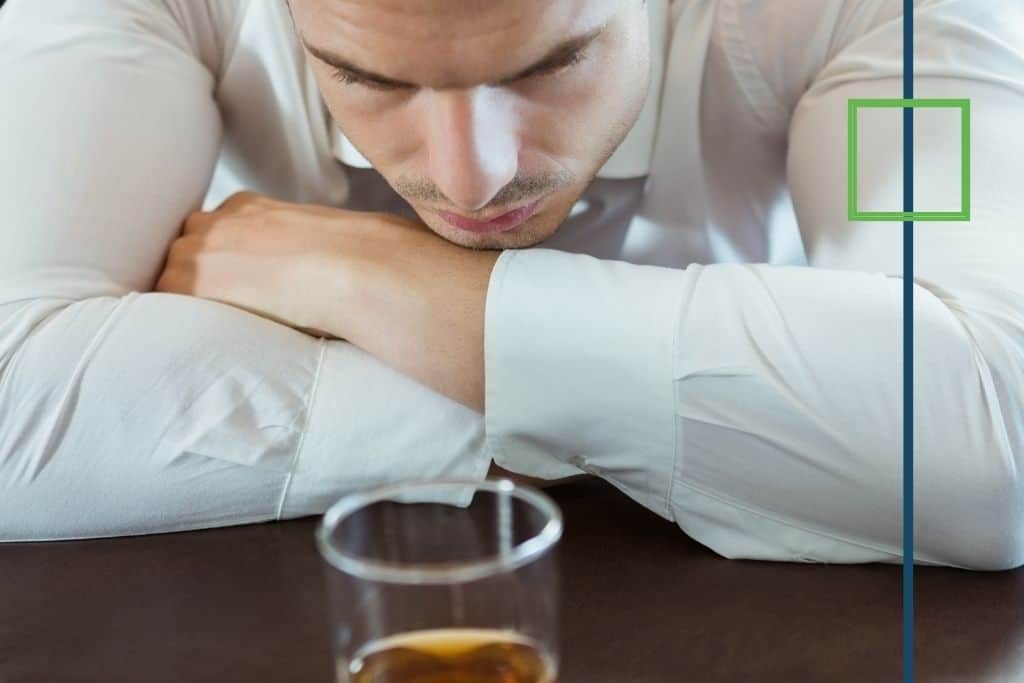An alcohol blackout is when a person suffers from memory loss as a result of binge drinking. A blackout from drinking is when a person experiences temporary memory loss and a feeling of lost time. During a blackout, a person is not unconscious. Many people in a blackout continue to engage socially and even continue to drink. However, they will have no recollection of their actions during a blackout the next day.
Two Types of Blackouts
- “En Bloc” Blackouts: An en bloc blackout is when someone cannot recall several hours due to high BAC content. A person will not be able to form new memories until the BAC has lowered.
- Fragmentary Blackouts: Sometimes referred to as “brownouts,” fragmentary blackouts are when only certain events or small amounts of time are forgotten. Someone who experiences a fragmentary blackout is likely to remember something when prompted.

Someone experiencing a blackout may be more likely to participate in dangerous behaviors. These include drunk driving, property damage, and unplanned sexual encounters. A person in an outage will have no recollection of these activities once sober.

Get Your Life Back
Find Hope & Recovery. Get Safe Comfortable Detox, Addiction Rehab & Dual Diagnosis High-Quality Care.
Hotline(844) 597-1011What Happens When You Blackout from Drinking?
People who blackout from alcohol are at an increased risk of putting themselves at harm and other consequences. Getting treatment for alcohol abuse and addiction is the best way to prevent blackouts and other adverse side effects of drinking.
Excessive alcohol consumption can have many consequences and negatively impact several aspects of a person’s life. One of these consequences is the risk of a blackout. When a person blacks out, they experience amnesia and memory loss due to binge drinking.
Blacking out can increase a person’s risk of injury and other harmful consequences. The more alcohol a person consumes in a period, the more likely they are to experience a blackout.
Signs And Symptoms of An Alcohol Blackout
Because many people continue to engage in conversation and act normally, it may be hard to determine if someone is experiencing a blackout. It’s also possible that someone may be operating excessively intoxicated but not be in a blackout.
These are some signs and symptoms of an alcohol blackout:
- Trouble Walking
- Impaired vision
- Difficulty talking or following a conversation
- Forgetfulness
- Impaired judgment and participation in risky behaviors
- Repeating themselves during a conversation
- Distractibility
The more alcohol a person drinks and the higher their blood alcohol content, the more likely they exhibit signs of a blackout.
Get Help. Get Better. Get Your Life Back.
Searching for Accredited Drug and Alcohol Rehab Centers Near You?
Even if you have failed previously and relapsed, or are in the middle of a difficult crisis, we stand ready to support you. Our trusted behavioral health specialists will not give up on you. When you feel ready or just want someone to speak to about therapy alternatives to change your life call us. Even if we cannot assist you, we will lead you to wherever you can get support. There is no obligation. Call our hotline today.
(844) 597-1011Causes From Alcohol Blackout
Binge drinking is the primary cause of an alcohol blackout. The more alcohol a person consumes in a set amount of time, the more likely they will experience a blackout. A rapid rise in blood alcohol levels is what ultimately causes a blackout to occur.
It’s believed that as blood alcohol rises, the brain cannot transfer short-term memories into long-term memories. This means that, during a blackout, someone may be able to recall something a few minutes after it happened but not remember it several hours later.
They are consuming alcohol while dehydrated or on an empty stomach can increase the risk of a blackout. These conditions allow blood alcohol levels to rise much quicker than when someone is hydrated or has recently eaten. Additional factors that can influence the occurrence of a blackout include a person’s weight, gender, and the type of alcohol consumed.
Most Risk From Alcohol Blackouts
Women are at greater risk of blacking out than men, and young adults are at greater risk of blacking out compared to older adults. Differences in hormones, body composition, and physical size, which affect alcohol distribution and metabolism among genders, are likely the reason why women are more prone to blacking out. In addition, blackouts can occur at much lower BACs in people who drink and take sleep and anti-anxiety medications. Typically, adolescents and young adults are more likely to binge drink, and when they do, they are more likely to drink more alcohol per binge.
This is very risky and puts people at serious risk of experiencing legal, financial, and personal consequences, such as illness, mood disorders, sexual assault, physical violence, and hospitalization.
First-class Facilities & Amenities
World-class High-Quality Addiction & Mental Health Rehabilitation Treatment
Rehab Centers TourRenowned Addiction Centers. Serene Private Facilities. Inpatient rehab programs vary.
Addiction Helpline(844) 597-1011Proven recovery success experience, backed by a Team w/ History of:
15+
Years of Unified Experience
100s
5-Star Reviews Across Our Centers
10K
Recovery Success Stories Across Our Network
- Low Patient to Therapist Ratio
- Onsite Medical Detox Center
- Comprehensive Dual-Diagnosis Treatment
- Complimentary Family & Alumni Programs
- Coaching, Recovery & Personal Development Events
What Happens During a Blackout?
During a blackout, the hippocampus in the brain is unable to form long-term memories. As a result, a person can fail to remember large chunks of time despite being conscious.
Everyone experiences an alcohol blackout differently. Some people may struggle to stand or speak properly during a blackout, while others may outwardly appear completely fine. Regardless of how they seem, people in a blackout will be unable to recall their actions.
Many people in a blackout can still eat, talk, walk and perform other various activities. Many brain parts are alcohol tolerant and continue to function as normal despite high blood alcohol levels. This can make determining if someone is in a blackout more difficult, as they may continue to act in a seemingly routine manner.
It’s important to know that a blackout does not mean that the person loses consciousness. However, passing out or losing consciousness is also a potential consequence of binge drinking.
Blackouts vs. Passing Out
A blackout is not the same as “passing out,” which means either falling asleep or losing consciousness from drinking too much.
During a blackout, a person is still awake but their brain is not creating new memories. Depending on how much the person drank, it is possible to transition from having a blackout to passing out. [1]
World-class, Accredited, 5-Star Reviewed, Effective Addiction & Mental Health Programs. Complete Behavioral Health Inpatient Rehab, Detox plus Co-occuring Disorders Therapy.
CALL(844) 597-1011End the Addiction Pain. End the Emotional Rollercoaster. Get Your Life Back. Start Drug, Alcohol & Dual Diagnosis Mental Health Treatment Now. Get Free No-obligation Guidance by Substance Abuse Specialists Who Understand Addiction & Mental Health Recovery & Know How to Help.
Preventing An Alcohol Blackout
Limiting how much you drink is the best way to prevent an alcohol blackout. Many people can avoid blacking out by having only one or two drinks an hour and consuming water between each glass.
Other steps you can take to prevent an alcohol blackout include:
- Drink slowly
- Remain hydrated with water while drinking alcohol
- Avoid taking “shots” or “chugging” alcohol
- Consume the food before drinking
Knowing the signs and symptoms can also help decrease the risk of a blackout. For example, if you notice trouble keeping up with a conversation or recalling things, you should attempt to sober up to prevent blacking out.
Getting Treatment for Alcohol Abuse And Addiction
Experiencing blackouts is common among people who abuse or are addicted to alcohol. Seeking treatment for alcohol use disorder is the best way to prevent blackouts and other potentially harmful consequences. Proper treatment is often the most successful option for people struggling with alcohol addiction. This may include a medically supervised detox program to withdraw from alcohol as well as inpatient treatment. Inpatient treatment offers round-the-clock support as well as intensive programs of recovery.

We Level Up Treatment Center provides world-class care with round-the-clock medical professionals available to help you cope. We work as an integrated team providing information about alcohol blackout and other aspects of treatment. Make this your opportunity to reclaim your life. Call today to speak with one of our treatment specialists. Our specialists know what you are going through and will answer any of your questions.
Your call is private and confidential, and there is never any obligation.
Experience Transformative Recovery at We Level Up Treatment Centers.
See our authentic success stories. Get inspired. Get the help you deserve.
Start a New Life
Begin with a free call to an addiction & behavioral health treatment advisor. Learn more about our dual-diagnosis programs. The We Level Up Treatment Center Network delivers recovery programs that vary by each treatment facility. Call to learn more.
- Personalized Care
- Caring Accountable Staff
- World-class Amenities
- Licensed & Accredited
- Renowned w/ 100s 5-Star Reviews
We’ll Call You
Sources
[1] Interrupted Memories: Alcohol-Induced Blackouts – National Institute on Alcohol Abuse and Alcoholism


